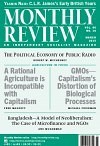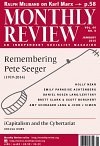United States

From its earliest years, Monthly Review has been distinguished among socialist publications by the degree to which it has incorporated environmental views into its fundamental perspective. Paul Sweezy’s 1950 article, “An Economic Program for America”…listed conservation of natural resources and the elimination of destructive waste as two of the primary goals in the development of socialism. He called for the socialization, long-term planning, and conservation of “coal…oil and natural gas and all the other fuels which provide the lifeblood of modern industrial society.” Scott Nearing’s monthly column “World Events,” written for MR from the early 1950s to the early 1970s, regularly examined environmental, along with political-economic, developments. Nearing was a socialist economist and environmentalist.… With the publication of Rachel Carson’s Silent Spring in 1962, Nearing explored its wider ecological implications, contending that civilization had entered the “phase of suicidal destructivity…. Without doubt man has built a pyramid of potential destructivity…. Man is a destroyer as well as a builder. He has exterminated entire species…. He has destroyed forests and opened the soil to erosion. He has engaged in fratricidal wars that have wiped out one civilization after another and presently threaten to end western civilization” (Nearing, “World Events,” Monthly Review, November 1962). | more…
The Political Economy of Noncommercial Radio Broadcasting in the United States
In this essay, I look at the problems facing progressives and those on the political left in the United States in participating in political analysis and debate in mainstream journalism and the news media. I focus on radio broadcasting, as this is where much of political discussion takes place in the United States. Radio broadcasting is the least expensive of the media for production and reception, is ubiquitous, has adapted itself to the Internet, and is uniquely suited for locally based programming.… I look specifically at my own experience hosting a weekly public affairs program on an NPR (National Public Radio)-affiliated radio station in Illinois from 2002–2012. This was, to my knowledge, the only NPR series hosted by a socialist in the network’s history. | more…

Marsh identifies four sources for our contemporary malaise (death, money, sex, democracy) and then looks to a particular Whitman poem for relief from it. He makes plain what, exactly, Whitman wrote and what he believed by showing how they emerged from Whitman’s life and times, and by recreating the places and incidents (crossing Brooklyn ferry, visiting wounded soldiers in hospitals) that inspired Whitman to write the poems. Whitman, Marsh argues, can show us how to die, how to accept and even celebrate our (relatively speaking) imminent death. Just as important, though, he can show us how to live: how to have better sex, what to do about money, and, best of all, how to survive our fetid democracy without coming away stinking ourselves. The result is a mix of biography, literary criticism, manifesto, and a kind of self-help you’re unlikely to encounter anywhere else. | more…

John Cassidy, who writes on economics for the New Yorker, is in our view one of the most interesting anhd creative commentators on economic analysis and trends writing in the mainstream today. His perspective might be best characterized as institutionalist-realist, in the tradition of thinkers like Thorstein Veblen, John Kenneth Galbraith, and Hyman Minsky.… Cassidy’s latest critical contribution is an online New Yorker news item published on December 12, 2014, carrying the rather prosaic title, “The Winner of the Spending Bill Vote: Jamie Dimon.”… [In this piece] Cassidy…explain[s] how the spending bill passed by the House of Representatives included a rider that rolled back regulations that had been imposed after the Great Financial Crisis on some of the riskier activities of banks. Such speculative activities were to be transferred to the unregulated bank subsidiaries not covered by the federally guaranteed bank insurance system. This has now been reversed and banks are again allowed to engage directly in such high-risk speculative activities, with the losses being picked up by the general public.… There is no doubt that Cassidy is correct, and that the analyses of “left-left” thinkers like Sweezy, one of Monthly Review’s founding editors, and Chomsky, an MR author, have been generally on the mark in pointing out that such outcomes are to be expected in the state management of the economy. | more…
The Liberal Attack on Naomi Klein and This Changes Everything
Naomi Klein’s new book, This Changes Everything [argues that the source of the looming crisis from climate change] is not the planet, which operates according to natural laws, but rather the economic and social system in which we live, which treats natural limits as mere barriers to surmount. It is now doing so on a planetary scale, destroying in the process the earth as a place of human habitation.… In the age of climate change, Klein argues, a system based on ever-expanding capital accumulation and exponential economic growth is no longer compatible with human well-being and progress—or even with human survival over the long run.… In this way Klein…signals that she has now, in William Morris’s famous metaphor, crossed “the river of fire” to become a critic of capital as a system.… [This] has led to a host of liberal attacks on This Changes Everything, often couched as criticisms emanating from the left. These establishment criticisms of her work, we will demonstrate, are disingenuous, having little to do with serious confrontation with her analysis. Rather, their primary purpose is to rein in her ideas, bringing them into conformity with received opinion. If that should prove impossible, the next step is to exclude her ideas from the conversation. | more…
Many people think of cooperatives as small, locally owned businesses, such as groceries, cafes, or bicycle shops, where people can work in an equal and participatory non-capitalist organization. In reality, the U.S. co-op movement is tied to federal agencies whose agenda is promoting neoliberalism, both domestically and abroad, and the co-op movement itself has neoliberal leaders. Many co-ops in name are profit-driven capitalist corporations in practice. And even in the abstract, the co-op principles of smaller co-ops enable neoliberal cooperative politics. All of this, however, raises the question of what a co-op based on socialist values would be, and China’s Nanjie village provides a living example of that. | more…
Three years after the fact, the event called Occupy retains its strange strategic inconsistency. It is something we still do not know how to think about.… We should take this illegibility seriously, not only as a tactical decision, but also as a reflection of the inadequacy of our inherited categories in describing the current logic of class struggle. This inadequacy should not surprise us; on the contrary, it confirms the ongoing vitality of the real movement to abolish the state of our present situation. Approaching Occupy requires that we separate out what happened from what was said about what happened, and place both in political-economic context. In what follows I briefly consider the first and third of these, and hope to address the second in the near future. | more…

The publication of socialist books in the United States has always encountered serious institutional obstacles. This can be seen in the enormous hurdles that stood in the way of the successful publication 130 years ago of the English translation of Engels’s The Condition of the Working Class in England (1845)—today recognized as the classic account of the impact of the Industrial Revolution on workers. In 1885 Florence Kelley (-Wischnewetzky), the daughter of William D. Kelley, a U.S. Congressman and supporter of Lincoln, translated Engels’s book into English. Her initial plan was to publish the translation in the United States with the respected publishing firm of G.P. Putnam & Co. However, Putnam declined to publish it on the grounds that the book was outdated…and did not apply to U.S. industrialization, where such conditions of class exploitation were supposedly absent.… It is owing to these difficulties, associated with the U.S. publication of his book, that we have the benefit of some of Engels’s more important comments regarding the problem of publishing socialist works in a capitalist society. | more…
Our friend and comrade Pete Seeger died a year ago this month, on January 27, 2014. Pete was a long-time reader of Monthly Review and, occasionally, a writer for this magazine. Harry Magdoff used to say that when a letter arrived from Pete, nearly always handwritten and often pages long, responding to an article or suggesting a topic to be covered or a book to be reviewed, it would go right home with him, to be pondered, considered, answered, and, especially, enjoyed. Seeger’s communications were never innocuous: he would tell the editors that something MR had published was wrongheaded (or, sometimes, right-headed); he would take an idea, turn it over, and suggest where to go with it. Like his music, Seeger’s letters demanded engagement, participation—and action. He had a special place in the MR family. | more…
Pete Seeger was bigger than life. And like a character in a mythological tale, before long his shoe size will grow to such a degree that he will scale snowy mountains and wade across oceans. He will look over the tops of Redwood trees and when he dips his hand down into the Hudson River, the water up to his elbow, his fingers will reach down to the bottom of the deepest pool and pull up a giraffe and a baby grand and we will forever sing about the magic river.… This mythology will be enjoyed by the living for generations to come. A next generation of troubadours will sing deep into the little faces who, with wide eyes, imagine such a music man. | more…
In the many accolades Pete Seeger received…after his death, there was often something missing—as absent in tributes from admirers who share his revolutionary politics as in those aiming to reclaim him for respectability. That absence is Seeger’s role as an organizer, and, more broadly, the role of music (and other kinds of cultural work) as organizing, which his life exemplifies.… Seeger’s work as an organizer may have been most obvious, its goals most blatant, in the field…. But his work, as a singer, as a song-collector, as a song-teacher, was not any less a labor of organizing in the concert hall. And that’s not exceptional. That…is what makes someone a radical cultural worker. What’s exemplary about Pete Seeger is how damn good at it he was. What we need to pay attention to and learn from is how he did this important work so well. | more…
Remembering Pete Seeger and Camp Woodland
I attended Camp Woodland, a progressive summer camp in upstate New York, for four summers starting in 1955 when I was ten years old. When Pete died last year, it was my fellow Camp Woodlanders that I most wanted to connect with.… Fortunately, a camp reunion in 2012 had revived many old friendships. “Pete’s music was the soundtrack to our lives,” one former camper reminisced on the camp listserv. “Pete modeled our values and transformed how we lived in the world, just like at camp,” another wrote. | more…



